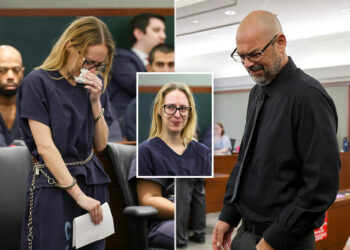This article has been updated to include additional information from an article posted by Atmore News on November 2, alleging that the arrested journalists were ordered during their initial appearance to refrain from publishing future stories about “criminal and civil matters that might come before a grand jury.”
Local newspaper publisher Sherry Digmon and reporter Don Fletcher were arrested in Atmore, Alabama on October 27 and accused of revealing information about a grand jury investigation related to the Escambia County School Board.
The press arrests follow a contentious season for the county’s school board, where Atmore News publisher and co-owner Digmon serves as a member. Digmon is accused of approving an article that “contained grand jury information” and allowing it to be printed, and Fletcher is accused of revealing information from the grand jury investigation through his reporting.
On Wednesday, Digmon was also charged with two felony counts of violating state ethics law for allegedly using her school board position to solicit a thing of value by selling more than $2,500 in advertisements to the board. Ethics law prohibits public officials in Alabama from soliciting money/things of value but “routine business transactions” are exempt.
Both journalists have been released on bond. In an article headlined ‘No Secrets,‘ Atmore News staff reported that Fletcher and Digmon were ordered by District Judge Eric Coale and signed statements agreeing as a condition of their release on bond that they were to have “no communications about ongoing criminal investigations including schools and other(s) until they are public record.”
Abuse of grand jury information is a felony under Alabama law. District Attorney Stephen Billy told the local Atmore Advance “it’s not allowed.”
“You just can’t do that, and there’s no reason for that. Innocent people get exposed, and it causes a lot of trouble for people,” Billy said.
The Freedom of the Press Foundation (FPF) disagrees with the district attorney’s assessment of the law.
“Arresting journalists for reporting the news is blatantly unconstitutional,” FPF Director of Advocacy Seth Stern said in a statement. “Grand jury secrecy rules bind grand jurors and witnesses, not journalists. The district attorney should blame himself for failing to maintain the secrecy of grand jury proceedings, not jail journalists for doing their jobs.”
In an email to the Associated Press, general counsel for the Alabama Press Association, Dennis Bailey, said he had “never seen a reporter arrested for publishing truthful information about the existence of a grand jury subpoena.”
“I do not know all the facts here, but based upon what I have seen so far, it is my opinion reporters who receive and publish unsolicited tips about the actual issuance and service of a grand jury subpoena do not violate Alabama grand jury secrecy laws unless they coerced someone to provide the information,” Bailey said.
The Committee to Protect Journalists condemned the arrests on Tuesday.
“CPJ is outraged by the arrest of Atmore News publisher Sherry Digmon and reporter Don Fletcher and calls on local authorities to immediately drop all charges against them. They should not be prosecuted for simply doing their jobs and covering a matter of local interest, such as the allocation of school board funds,” CPJ U.S./Canada program coordinator Katherine Jacobsen said in a statement.
“Journalists play a crucial role in their local communities. Arresting them creates a chilling effect and is a gross misuse of taxpayer funds.”
In the article at the center of the arrests, Fletcher reported on an October 12 meeting of the Escambia County School Board where County District Attorney Stephen Billy shared that his office was investigating potentially criminal misuse of federal COVID-19 relief funds by the board. Fletcher reported that DA Billy also sternly endorsed incumbent superintendent Michele McClung. McClung’s contract was not renewed following a 4-3 vote, and Fletcher, in a following article, described the district attorney as “upset” about the result of the vote.
Fletcher reported that Atmore News had acquired documents confirming that subpoenas were issued in September to a financial officer and a bookkeeper who both work for the school system for checks labeled ‘COVID’ or ‘COVID BONUS’ between 2020 and 2023. Fletcher cited a pay schedule from a former superintendent from August 2021 that placed the bonus pay at $5,300 per month total.
The bookkeeper, Veronica “Ashley” Fore, was also arrested with Fletcher and Digmon for allegedly leaking the documents that were the basis for Fletcher’s story.
Before his arrest, Fletcher told 1819 News that the documents, including subpoenas and search warrants, were left at the Atmore News office. While those involved in a grand jury would be prohibited by law from sharing information gained during proceedings, reporting on information given to Journalists – even if originally came from a source who broke the law by sharing it – is a protected practice under the First Amendment. State laws cannot create a prior restraint barring press from disclosing grand jury information obtained from sources without chafing against the constitution.
When Fletcher and Digmon were arrested, Billy told the Advance that the arrests stemmed from this article, where the subpoenas and relief checks were mentioned and specific staff were named. He denied that he brought up the investigation and the COVID relief checks at all, calling Fletcher’s article on the meeting “misinformation” and the reporting “calculated.” Billy told the 1819 news that some of the statements he was quoted on in Fletcher’s article were “fabricated.”
In another article about the meeting, Fletcher reported that Billy insinuated on the day of the vote that any board member who voted against renewing McClung’s contract was violating their oath of office.
In a recent article timestamped October 25, Fletcher reported that on Monday, October 23, Escambia county sheriff’s deputies with search warrants seized the cell phones of all four school board members who voted against McClung’s contract renewal. Those members included Atmore News publisher Digmon.
At the time, Fletcher cited an unnamed source who alleged that Billy planned to charge the four ‘no-vote’ members with violating Alabama Open Meetings Law by coordinating in a phone call outside of normal business in order to cause a meeting in September to be canceled without quorum.
However, while open meetings law violations in Alabama were once part of criminal statute, the Alabama Open Meetings Act establishes only civil remedies for violations. The board members whose phones were allegedly seized have so far not been charged with any crime.
Theodore J. Boutrous, an attorney with experience in similar media law cases, told the Washington Post that the arrests of Digmon and Fletcher in Escambia were “extraordinary, outrageous and flatly unconstitutional.”
On Wednesday, after Digmon’s second arrest, the Freedom of the Press Foundation released a statement.
“Authorities should drop the charges immediately. But that’s not enough. The journalists should sue and those responsible should be investigated and disciplined.” Stern said.
“The officials involved either knew the arrests were unconstitutional and proceeded anyway or don’t realize their actions are completely indefensible under the First Amendment.”
With regards to the charges against Digmon related to the school board buying advertising at the Atmore News, Stern said in his statement that “it seems highly suspicious that prosecutors first objected to the school district’s presumably longstanding practice of advertising in a local paper immediately after the paper published content that angered the district attorney.”
“We don’t arrest journalists in this country for reporting news that authorities would prefer to keep secret,” FPF Deputy Director of Advocacy Caitlin Vogus said.
The FPF compared the case to the 2007 arrests of the founder/editors of the Phoenix New Times by notorious former Maricopa County Sheriff Joe Arpaio on similar charges. While in that case charges for revealing grand jury secrets were dropped less than 24 hours after they were made, the two reporters sued for wrongful arrest and ultimately received a settlement of $3.75 million.



























